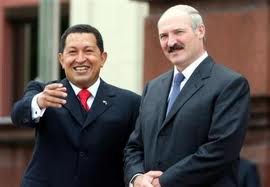Belarus is Europe’s last dictatorship. Andrej Dynko explains how the country’s president Alexander Lukashenko retains his tight grip on power
The ministers of defence and internal affairs, the heads of the KGB and the presidential security service — not one of them was born in Belarus. It is unique in 21st century Europe that one man controls the executive, legislature and judiciary of a sovereign state. He appoints the head of the Electoral Commission, and the head of the country’s top media. If he mentions someone at a meeting, that person must stand. His son Kolya, in full ceremonial uniform, watches military parades next to his father, and country’s generals salute them. The head of state even changed his birthday so he could celebrate it on the same day as his beloved youngest son.
 I asked a Venezuelan political scientist why Hugo Chavez supports Lukashenko. He replied: “Lukashenko shares with him the knowledge of how to retain power.” And it works. Lukashenko could explain how he subordinated all public institutions to the presidency and how he set about purposefully weakening all remaining social structures he had failed to subordinate.
I asked a Venezuelan political scientist why Hugo Chavez supports Lukashenko. He replied: “Lukashenko shares with him the knowledge of how to retain power.” And it works. Lukashenko could explain how he subordinated all public institutions to the presidency and how he set about purposefully weakening all remaining social structures he had failed to subordinate.
Lukashenko came to power on the back of politicians and officials from the Gorbachev generation. They had grown accustomed to freedom and behaved as free citizens. Some even naively hoped to help Lukashenko lead the country.
Lukashenko used extreme measures to achieve “stability”. His first prime minister, Mikhail Chyhir, was jailed. Parliament’s speaker Syamen Sharetsky was forced into exile, as was as former parliamentarian and opposition leader Zyanon Paznyak. Former deputy prime minister Victor Ganchar and the interior minister Yuri Zakharenka disappeared; some think they were killed.
Lukashenko drew conclusions from his experiences in the first years of his reign. Lately he has tried not to let any charasmatic political figures gain a following.
In recent years, all the prime ministers and heads of the houses of parliament have been older than Lukashenko, with the personality and prescence of a bucket. The dictator’s approach to the selection of law enforcement agencies’ heads was particularly interesting. To date, none of the leaders of four major law enforcement agencies — the Presidential Security Service, State Security Committee (KGB), the Ministries of Interior and Defence — were born in Belarus (Vtyurin, Zaytsev, Kuleshov, Zhadobin). All of them come from other former Soviet countries. Are they Russians, one may ask. No, I would call them Soviets. Mostly they are children of military personnel whose homeland was not a country, but military camps of the former Soviet empire. The head of the Central Electoral Committee, Lidiya Yermoshina is also the daughter of a Soviet officer. These people perceive the collapse of the Soviet Union not only as a geopolitical tragedy, but a personal tragedy. They supported the Soviet populist Lukashenko because they were afraid to remain strangers in new nation states.
There was, however, another reason in choosing these mercenaries. According to Belarusian law, non-natives do not have the right to become president. By promoting foreigners, Lukashenko has therefore protected himself from the emergence of figures who have an alternative power base.
Ottoman Sultans used Janissaries for that purpose. Gaddafi used the same logic when he created a personal guard composed entirely of women. Unlike other modern European states, which are based primarily on a sense of national solidarity and cultural unity, Lukashenko’s state is kept together to a greater degree by loyalty to the lord, and fear of him.
However, the Sultan is becoming too dependent on his mercenaries. This is the time bomb underneath Belarusian sovereignty. The country is losing its language as more people speak Russian, instead of Belursian. It has no anchor in the EU or NATO. It is significant that many of Lukashenko’s prominent officials moved to Moscow after their resignations. The former chief of the presidential administration and foreign minister Latypov, the former KGB bosses Mackievich and Yerin, a former Interior Minister Naumov now work in Putin’s opaque business structures.
Lukashenko’s model of dictatorship has made Belarus a central European country of 10 million people totally dependent on Russia for its security, economy, and senior personnel.
Andrej Dynko is editor of NN.BY / Nasha Niva newspaper, one of the few opposition newspapers in Belarus.





